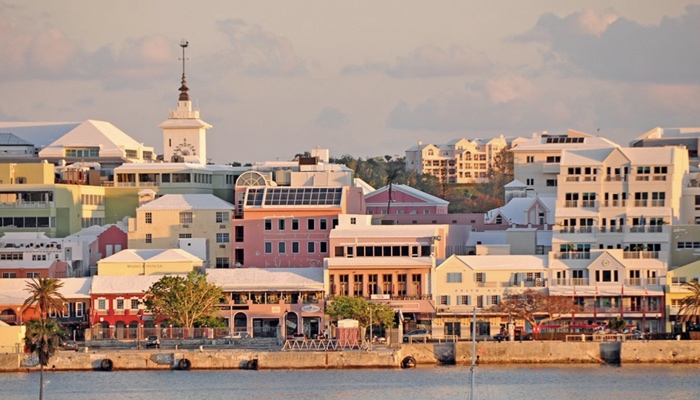Bermuda has built its economy on offshore finance, insurance and tourism, but the overseas territory is making a concerted effort to move into new areas, including blockchain and cryptocurrencies, reports Nick Martindale for economia.
If you mention Bermuda to most people, chances are they will either think of its famous pink-sand beaches or its reputation as a centre for offshore finance. While both elements are part of the make-up of the British Overseas Territory in the North Atlantic, they do not tell the full story. Bermuda has built its economy on the insurance industry, and is increasingly moving towards emerging markets such as fintech and cybercurrency.
The island’s premier, David Burt – its youngest-ever leader, who was elected in 2017 – told economia about his attempt to try to diversify the economy. “People have different definitions of offshore finance, but from a Bermudian perspective what we have been strong on and what makes us different is our substantial insurance market, which is really our calling card as the world’s largest property and casualty market,” he says. “We’re one of the world’s largest markets for insurance and reinsurance, and one of only two countries that hold regulatory equivalents on risk with both the US and the EU.”
International business based around the insurance sector, supported by leading law firms, company administrators, actuarial consultancies and accountants, is the largest element of the island’s economy today, says John Johnston, CEO of Deloitte in Bermuda and the Caribbean region. “The Bermudian model has largely been one of innovation to solve business needs, and responding to opportunities in a way that other jurisdictions haven’t been able to do,” he says.
“The development of the captive insurance business here about 50 years ago is a good example of that; a captive can solve a fundamental risk management issue for a company in a way that is well regulated, efficient and more economical than laying off risk directly to the commercial market.” More recently, the island has also become a base for reinsurance and insurance-linked securities businesses, with commercial insurers and private equity firms attracted by the favourable regulatory environment.
The legal infrastructure on the island has also been boosted in recent years by a number of offshore magic circle law firms, adds Thomas Burton, Managing Director of boutique search firm Hamilton Recruitment. “There’s now quite a range of specialist law firms which weren’t there five or 10 years ago, and that means Bermuda has more firepower than it did before in terms of legal support and advisory services,” he says. “It all makes for a more enticing prospect for a company looking to set up there.”
The offshore finance element of the economy remains, as a base for hedge funds and trusts investing money for private clients. “Bermuda has been in that space since the 1970s when the first hedge funds started coming into focus,” says Johnston. “We have about 800 funds on the register with the regulator.
“There are also wealthy individuals and families who use Bermuda as a jurisdiction to structure their wealth and succession planning through trusts, and there’s an overlap there because the generation that produced the wealth is now passing that on to their heirs who are into things like technology and socially responsible investing,” he says. “There’s a nice dovetailing between our trust and private client industry and this new growth industry around technology.”
Currently, the island is the UK’s only overseas territory able to refuse to accept the ruling of the UK parliamentary vote requiring compulsory public disclosure of corporate beneficial ownership, which has prompted concerns that this may give it an unfair advantage over other territories. Burt denies this, stressing the island has held a central register of beneficial ownership for more than 70 years.
“We know who owns companies in Bermuda, and we have never been a place where you can and do have secrets, so we don’t look at it from a perspective of competitive advantage,” he says. “When it is a global standard for there to be a public register of beneficial ownership then Bermuda will comply with that.”
The Bermuda Business Development Agency also stresses that tax authorities can request and receive information under a number of tax transparency partnerships, and that it does not meet the OECD’s definition of a tax haven, despite the lack of income tax, as a result of its transparency. “We’re making sure that people know that we do have a register of beneficial ownership here and have done for many years,” says Sean Moran, interim CEO. “That’s a differentiator because a lot of other international financial centres have not, and are playing catch-up.”
The economy is in a period of growth, after years of decline in the wake of the global downturn, which hit Bermuda later than many other economies. Oxford Economics forecasts GDP growth of 1.9% in 2018 on the back of 1.7% the year before, with investment expected to rise by 9%. S&P Global Ratings recently upgraded its outlook on Bermuda to “positive” and also affirmed its A+ long-term sovereign credit and senior unsecured debt ratings.
One reason for this growth is the island’s other major established sector – tourism – and in particular two large investment projects, at the LF Wade Airport and St Regis Hotel. “Early indications were that the new PLP government would scrap the LF Wade Airport Terminal project, but David Burt decided earlier this year to move ahead with the $280m project,” says Jake McRobie, associate economist at Oxford Economics. “It would have been a negative for the economy had they cancelled that.”
The island benefits from tourism from both the US and international business travellers, adds Johnston, while the hosting of the 2017 America’s Cup yacht racing also drew attention to the territory. “We have also seen some investment in existing hotels,” he says. “The international visitors and travellers that Bermuda attracts demand a quality product, and that requires constant investment.”
More recently, however, the island has sought to position itself as a base for fintech firms, and those in the emerging areas of blockchain and cryptocurrencies. “As our insurance industry matures there is certainly a need for economic diversification, and that’s one of the things we spoke about very loudly in opposition,” says Burt. “Now that we are in office we are advancing that agenda.”
The government recently introduced the landmark Companies and Limited Liability Company (Initial Coin Offering) Act and the Virtual Currency Business Act, which provide the world’s first cryptocurrency regulation, in a bid to encourage more firms to base themselves on the island.
“For large institutional players that are well established and can pass the test to enter the Bermudian jurisdiction, which means you need very high standards when it comes to anti-money laundering, due diligence and counter-terrorist financing, this can be the place for a well-regulated system,” says Burt. “Bermuda has a reputation to protect so we put a temporary hold on certain companies looking to do this type of business, until we came up with a regime that would meet our standards.”
This is already having an impact; to date 43 companies have either already started up in Bermuda or are applying to do so, including blockchain network Shyft, which recently invested $10m in boosting local education, infrastructure and skills on the island. “Bermuda demonstrated a commitment to writing the necessary legislative changes for us to implement our vision for an interoperable, blockchain-based, jurisdictional framework,” says Bruce Silcoff, Shyft International CEO. “It also offered us the potential in which new products and solutions could be incubated.”
Bermuda also recently signed a memorandum of understanding with Medici Ventures, which will see the island become a base for its laboratory for leading-edge blockchain innovations, creating at least 30 jobs over three years.
Despite the generally favourable economic outlook and its newfound markets, there are challenges for the Bermudian economy. Johnston identifies a downward pressure on insurance and reinsurance rates as one concern, compounded by the impact of global delivery centres which has seen some international firms move jobs away from Bermuda.
Then there’s the wider regulatory climate. “Bermuda and many offshore countries have faced an increasing challenge from the EU, the OECD and others around transparency, tax fairness, economic substance and other topics,” he says. “Whatever your view about the fairness of these initiatives, the reality is that the way we deal with that over the next couple of years will be quite crucial. No jurisdiction wants to be on an EU grey list, let alone a blacklist.”
He also points to a high level of public debt as a longer-term concern, as well as the island’s immigration system, which he believes needs urgent reform to ensure the territory remains attractive for international businesses. For Burt, a bigger issue is to make sure the benefits of any economic growth are felt by local people on the island, including developing skills and ensuring people can afford to get on the housing ladder.
“It doesn’t help if you upgrade economic growth but your citizens cannot be a part of it,” he says. “We need to put in place the right policies to ensure we have balanced growth that affects the entire cross-section of the economy, and is not limited to certain sectors. That’s our biggest challenge right now.”
A place in the sun
With its enviable climate and attractive tax regime – with zero income or capital gains tax – Bermuda can be an appealing destination for accountants looking for a fresh challenge.
Thomas Burton, Managing Director of Hamilton Recruitment, worked in the United Kingdom and Bermuda for Deloitte before moving to work in the island’s insurance management sector, eventually going on to start his own recruitment firm placing accounting and legal professionals on the island.
“You can get great financial services experience that you may not get in other parts of the UK, outside London or Edinburgh,” he says. “We tend to find that one of the selling points is that it gives you a second bite of the apple. You’ll get experience on cutting-edge financial products such as insurance or hedge funds in an international reporting environment, often working for US clients.” Many people choose to stay on the island for a few years before returning to the UK, or heading to New York or Chicago”, he adds.
While there is a strong emphasis on developing local talent, there is still a need for overseas accountants, adds John Johnston, CEO of Deloitte in Bermuda and the Caribbean region. “In Deloitte alone in Bermuda, we have accountants from 16 different countries,” he says.
“One of the CEO clients I had who was a New Yorker once told me you could find a jurisdiction with greater career potential such as New York or London, or a place where the lifestyle and natural beauty are better, but you’ll rarely find a place that offers both, and Bermuda does. The young accountants we see here have a fantastic lifestyle and career experience.”
Source: Economia Magazine (December 2018)





![Enjoy All Your Bermuda Days [Video]](https://www.hamilton-recruitment.com/wp-content/uploads/2022/06/Parade-700x400-1-500x383.jpg)
![Bermuda Careers for Actuaries [Video]](https://www.hamilton-recruitment.com/wp-content/uploads/2022/03/Video-Actuaries-700x400-1-500x383.jpg)
Leave A Comment
You must be logged in to post a comment.